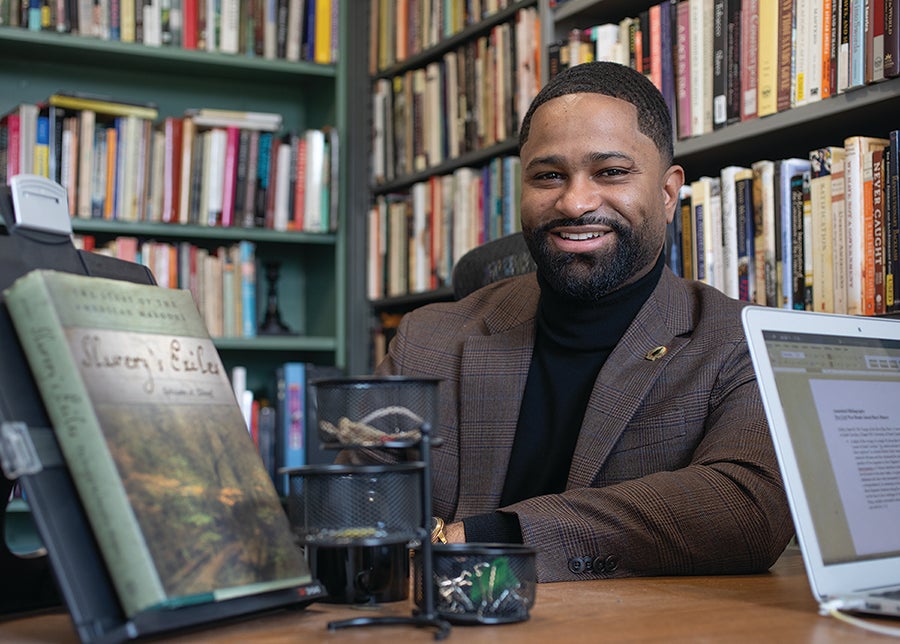KINGSTON, R.I. – Jan. 13, 2022 – In the violence of the Jan. 6, 2021, insurrection in Washington, D.C., Marcus Nevius saw a call to action.
“I think today we engage in our democratic processes – voting or running for office – while taking for granted that our political institutions will always endure in the forms we know,” says the University of Rhode Island associate professor of history and Africana studies. “But historically, and in the present, democracy requires vigilance, and requires respect.”
Nevius, an author and historian, recently served as one of the experts on the PBS documentary “Preserving Democracy: Pursuing a More Perfect Union.” The film explores U.S. democracy from the American Revolution to the 2021 assault on the U.S. Capitol that attempted to prevent the certification of the 2020 presidential election.
With a lineup of historians, political experts, activists, and journalists, the two-hour film provides a historical backdrop to the United States’ 250-year-old “grand experiment” with democracy and an encourages people to think critically about their role in preserving it. Along the way, the film investigates U.S. democracy’s ideals and flaws, the cycles of civil rights progress and backlash, shifting voter rights and rules and the role of civics curricula in creating engaged and informed citizens.
An expert on slavery and African Americans in the early U.S. republic, Nevius contributed to the film’s discussion of the U.S. in the 1850s, when continued compromises that allowed slavery to grow with the country exploded into bloody feuds between pro- and anti-slavery forces – both around the country and in the halls of Congress.
“These struggles had deep roots in U.S. and Atlantic world imperial and colonial contexts, reaching back to the earliest years of colonization in the 1500s,” Nevius says. “The republican democracies that emerged in the late 18th century inherited the problem of slavery, and its attendant polarizing politics. That Kansas bled in the 1850s … or that blood was drawn in the U.S. Congress – these were but stages in a much broader historical drama centered on slavery.”
Nevius, who holds bachelor’s and master’s degrees in history from North Carolina Central University and a Ph.D. in history from The Ohio State University, is the author of “City of Refuge: Slavery and Petit Marronage in the Great Dismal Swamp, 1763-1856.” His work has also been published in the William & Mary Quarterly, the Journal of African American History, the Journal of Southern History, H-Net Civil War, and History Compass.
He became involved with the PBS project after a fellow historian, Alexis Coe, mentioned his work to producer Matt Spolar of Retro Report, one of the production companies working with PBS on the documentary. In the documentary, Nevius joins a robust list of experts, including historians from institutions such as Harvard, Yale, Columbia and Georgetown universities, national journalists and former high-ranking government officials.
“Though we were interviewed in different locations and at different times, it has been humbling to share space with intelligent luminaries like Professor Jelani Cobb, Valerie Jarrett, Professor Joanne Freeman, Professor Eric Foner and others whose life’s work has contributed so much to preserving democracy and toward forging a more perfect union of the United States,” says Nevius. “This is all too important work that is a validation of my own studies, to be sure, but may also reach a new generation of Americans who may see in me a new voice, a new sort of representation.”
In its final form, Nevius says, the documentary is well produced and features a strong diversity of experts, all with a common interest.
“That common interest is a fundamentally important lesson about our nation’s history, our nation’s present, our nation’s future: democracy is fragile, and requires a well-educated, vigilant, fully-enfranchised citizenry to sustain,” he says. “The insurrection of January 6, 2021, demonstrated just how forcefully a fragile democracy might be threatened and deposed.”
Recognizing that threat is the first step.
“This isn’t necessarily a call to arms, but a call to action,” he says. “That action begins with valuing an education in the issues, their historical roots and their contemporary forms, such that we are inspired to act in the best interests of one another, of state, of nation, of democracy.”
“Preserving Democracy” premiered Jan. 6, the one-year anniversary of the Capitol insurrection, but can be viewed on the PBS website.

